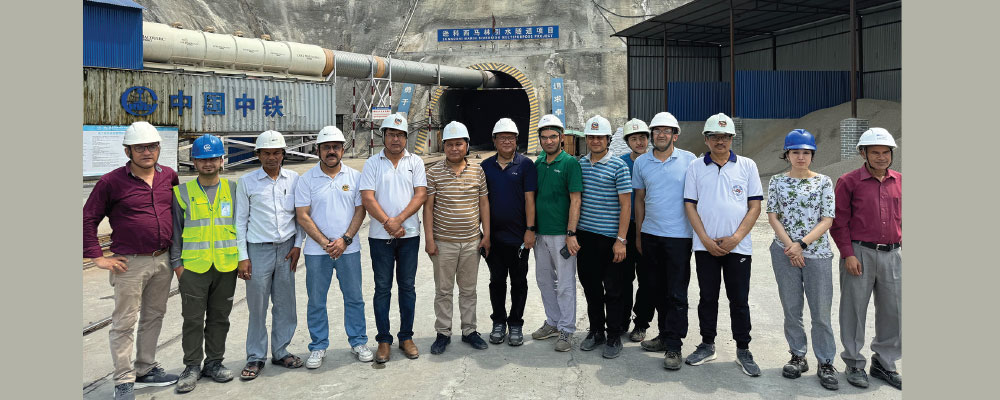Kathmandu, Apr. 23: The Nepal Electricity Authority has started preparations to use Tunnel Boring Machine (TBM) to dig the tunnels of the 1,063 MW Upper Arun and 635 MW Dudhkoshi hydropower projects.
After the successful and effective tunneling of Bheri Babai Diversion Multipurpose Project and Sunkoshi Marin Diversion Multipurpose Project by means of TBM, this technology is going to be used in Upper Arun and Dudhkoshi hydropower project as well, according to the NEA.
The length of the main tunnel of the Upper Arun Semi-reservoir Hydropower Project is 8.4 km and the length of tunnel of Dudhkoshi Reservoir Hydropower Project is 13 km.
The tunnels of hydropower projects, which take most of the construction time, are currently being constructed by drilling and blasting using explosives.
A team consisting of Managing Director of NEA Kul Man Ghising, Managing Director of Upper Arun Hydro-Electric Limited Phadindra Raj Joshi, Chief Executive Officer of Dudhkashi Hydropower Company Limited Bimal Gurung has inspected the site of Sunkoshi Marin Project and acquired information about the tunnel dug by means of TBM.
The team discussed the technical aspects of TBM, the problems and challenges faced while using it, geological complexity, cost and time, quality of work, effectiveness and other issues with the project management and construction professionals.
Ghising said that the time taken to dig the tunnels of the two irrigation projects using TBM was short and the work was of good quality, so the two hydropower projects with large tunnels are going to use this technology.
He said that the financial management of Upper Arun and Dudhkoshi hydropower projects has reached the final stage and tenders are about to be called for construction, so tender documents will be prepared to address the problems and experience of tunneling by TBM in Bheri Babai and Sunkoshi Marin Diversion Multipurpose Project. “As the length of Sunkoshi Marin Diversion and Dudhkoshi main tunnel is equal, we have advanced the process by digging it from TBM. There is a problem with the access road to supply TBM in Upper Arun, TBM will also be used in the project where it is possible to bring the machine,” Ghising said.
“Though it looks a bit expensive in terms of one-time investment, it is seen that the use of TBM will be cheaper and more effective considering the fact that when digging a tunnel with TBM. There is no need to construct other access tunnels, less environmental and social issues come up and less time is required for construction while using BTM.”
He said that the overall management of the project should be done in the beginning so that the tunnel construction can be completed quickly through the use of TBM but other structures cannot be completed.
A total of 18 km tunnel has to be constructed in Dudhkoshi, including length of the main tunnel of 13 km while the length of the two entrance tunnels to be constructed is 5 km.
The construction of Upper Arun is going to be advanced by arranging investment under the leadership of World Bank and Dudhkoshi Hydropower Project is going to constructed by managing funds under the leadership of Asian Development Bank.
At the price of 2019, the estimated cost of USD 1.75 billion (about Rs. 214 billion) including interest during the construction period and price increase will be raised in Upper Arun. Of this, 70 per cent will be financed by means of debt and 30 per cent by equity.
In the co-financing led by the World Bank, a plan has been made to arrange the financial management by raising funds from international financial institutions and domestic banks and financial institutions.
The estimated cost of the Dudhkoshi Hydropower Project is USD 2.2 billion (about Rs. 225 billion) including interest during the construction period. Of this, USD 1.68 billion is being raised from debt and the rest from equity to manage the finances.



COMMENTS